IJCRR - 8(9), May, 2016
Pages: 07-11
Date of Publication: 12-May-2016
Print Article
Download XML Download PDF
DELAY ANALYSIS OF ADHOC NETWORK USING NS 2.34
Author: Samiksha Nikam, B. T. Jadhav
Category: Technology
Abstract:Ad hoc network is popular nowadays due to the easy disposition and self-configuring nature. Hence, routing related issues encounter challenges in the ad hoc network. Such network is mainly used for transmission of text, picture and video data. The speed of data delivery decides the quality of service of the network. The quality of service depends upon the protocol used for data transmission. Efficient routing protocol improves the quality of service. The efficiency of the protocol is decided by evaluating different performance parameters like throughput, delay, packet drop, routing load, packet delivery ratio etc. The end to end delay is one of the most important performance parameter sofad-hoc network. It plays a major role in deciding the quality of service. The delay is measured as total time is taken by the packet to reach the destination. Delay in ad hoc network gets affected by the mobility of nodes, and a number of nodes connected to the network. The objective of this research paper is to analyze delay of ad hoc network for DSDV routing protocol. The delay is measured in high and low mobility scenario by changing various parameters of ad hoc network such as a number of nodes, pause time, speed, and connections between the nodes. Network simulator ns2.34 is used for this.
Keywords: Ad-hoc Network, DSDV, NS2.34, Performance Measurements, Delay
Full Text:
INTRODUCTION In ad hoc network nodes can enter and leave a network as per their wish. Hence, routes may break or new route forms during data communication process. Various routing protocols are designed for the ad hoc mobile network. The mobility of the nodes is major challenges researchers have to face while designing routing protocols. [2][12]. Due to self-organized nature of ad hoc network, it is very much popular nowadays. Most of the people using the adhoc network for transmission of multimedia data. The requirement for such transmission is that delay should be minimum. Delay in ad hoc network depends on the factors such as node density, the number of connected nodes, and the speed and mobility of the nodes. In this research paper researcher analyses the delay of ad hoc network in two different scenario such as, 1. By assigning maximum and minimum values for network parameters and running a simulation to evaluate delay for various combinations. 2. The delay is measured in low and high mobility scenario by changing number of nodes and speed of nodes.
DESTINATION-SEQUENCED DISTANCE-VECTOR (DSDV) PROTOCOL It is a first table driven ad-hoc network protocol. It is a hop by hop table distance vector routing protocol. In this protocol, each node maintains arouting table that contains all possible destinations within network and number of routing hops to each destination. The information in the routing table is updated by increasing sequence number which avoids counter to infinity problem. The sequence number shows freshness of route and route with higher sequence number are favorable. Each mobile node of ad hoc network maintains a routing table which stores information about all available destinations, the number of hops and a sequence number. Using this routing table packets are transmitted between the nodes. Routing tables can be exchanged between neighbors at regular interval to keep an up to date view of network topology. The tables are also forwarded if a node observes a significant change in local topology [4] [7][12].
PERFORMANCE METRIC The delay is the important performance parameter of ad hoc network. A network’s delay is defined as the time required forsuccessful delivery of data packets to the destination node. [1][7]. Delay performance parameter is an important entity to decide efficiency of the routing protocol. In DSDV protocol routes are already stored in routing table hence route establishment time is negligible. However due to the mobility of nodes routes get fail and this increases the delay in the network. In this research paper delay is measured by changing various network parameters in a different scenario.
SIMULATION PROCESS The simulations were performed using Network Simulator (NS2.34). Fig 1.2 shows various steps used in the simulation. Initially scenario and traffic files are generated. These files are used as input for TCL script. After execution of TCL script, two files are created i.e. NAM file and trace files. Trace files are used to analyze the behavior of the network. Trace files are analyzed using AWK scripts. Detailed simulation process steps are as follows. 1. Generate scenario and topology files using cbrgen and setdest commands. 2. Write TCL script (.tcl Extension file) 3. Execute TCL script (Use ns Command) 4. Generate Trace and NAM file. 5. Select performance parameters. (Delay). 6. Execute AWK script to measure performance parameter delay of protocol. 7. Plot a graph. Experiment No.1. The goal of the experiment is to examine and compute delay of ad hoc network when DSDV routing protocol is used.
To evaluate the delay of ad hoc network we consider 10 random simulation runs to generate 10 random scenario patterns. The result is calculated by taking an average of those 10 outputs. To carry out simulation experiment parameter values set to maximum and minimum levels as shown in table 1.1. As four input parameters are selected total 2^4 = 16 combinations are possible. Table 1.2 shows a simulated experimental reading for sixteen combinations of four input parameters.
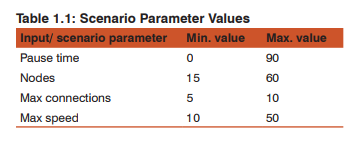
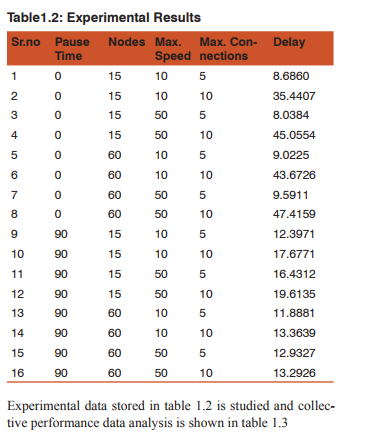
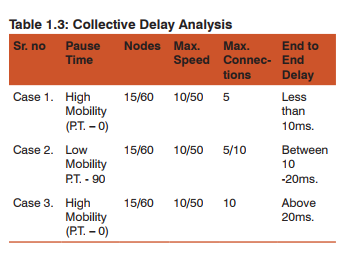
ANALYSIS OF EXPERIMENT 1 Case 1: Pause time means the amount of time for which node remains stable in the network. The pause time term relates with mobility of the nodes. Low pause referred as high mobility and high pause time referred as low mobility. In first case network mobility is high (P.T. = 0).It is observed that in high mobility scenario to maintain low delay in the network number of connections in between the nodes should below. Case 2: The mobility of the nodes plays an important role to maintain delay in ad hoc network. It is observed from Table1.3 that in a low mobility scenario delay is maintained at moderate level (i.e.10 to 20 ms). This is because in low mobility situation frequency of route failure is less and in DSDV protocol routes are already stored hence less time is required for route discovery. This reduces delay. Case 3: In the third case it is observed that in high mobility scenario as the number of connections between the nodes increased it will increase the delay significantly.
EXPERIMENT NO 2: In the previous experiment, we consider maximum and minimum values for the parameters and calculate delay. It is observed that delay depends on mobility and number of connections between the nodes depicted in table 1.3. To strengthen the collective analysis perform in the first experiment second experiment is performed. In this experiment simulation is run for case 1 and case2. Here case 3 is not considered because low delay always desirable in networking Case 1: In this case mobility is high i.e. P.T. =0.A number of nodes and speed of the nodes is variable. Nodes vary from 15 to 60 and speed of nodes changes from 10 to 50 ms. A number of connections between the nodes are5 and 10 respectively. The reading of the experiment is shown in table 1.4. either 5 or 10 respectively. The experimental data is stored in table 1.5
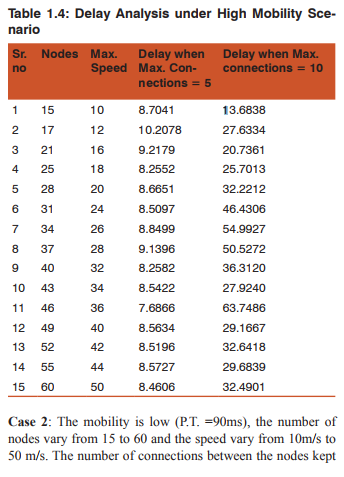
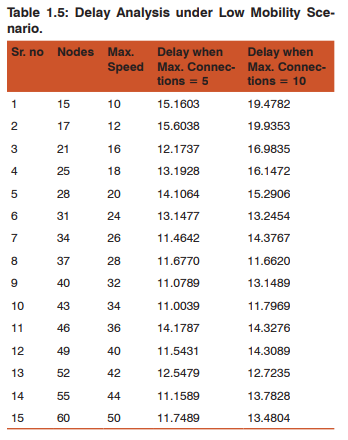
Analysis of Experiment 2: It is observed from table 1.4 that in high mobility scenario when a number of connections in between the nodes is 5 delays is less than 10 ms. When the number of connections between the nodes increases to the number10 delay increases more than 10 ms. This shows that a number of connections between the nodes affect the delay of ad hoc network. To maintain low delay in ad hoc network when DSDV protocol is used for routing try to keep a number of connections in between the nodes minimum. It is observed from table 1.5 that in low mobility scenario when a number of connected nodes are either 5 or 10 then delays maintain between 10 to 20 ms. It is concluded that delay depends on mobility and connection between the nodes of ad hoc network. By regulating these parameters low delay can be preserve in the ad hoc network.
EXPERIMENT NO 3: To scrutinize effect of a number of connections on delay in ad hoc network this experiment is performed. In this experiment speed of the nodes is kept constant at 40ms. And a number of nodes are 100. Connections between the nodes vary from 5 to 75 and delays measured in high and low mobility scenario. The reading is shown in table1.6.
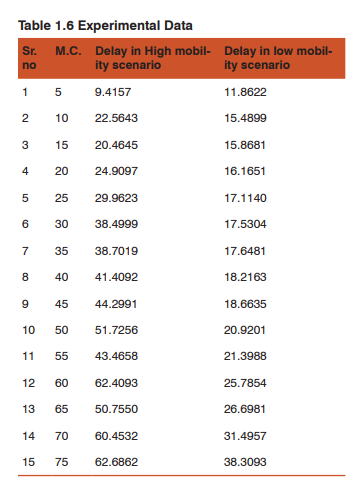
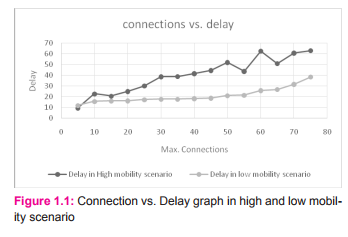
Analysis of Experiment No 3 It is observed that as the number of connections increases delay is increasing in both the cases. However in low mobility case delay maintain at a lower level than high mobility scenario. In high mobility scenario nodes are continuously moving. In DSDV protocol, each node maintains a routing table which contains information of other nodes in a range. The continuous movement of nodes requires frequent updating of routing tables this increases the delay in the network.
CONCLUSION This simulation-based study is conducted to analyze delay of ad hoc network when DSDV routing protocol is used. Ad hoc network has dynamic topology which raises various performance issues. The delay is important parameters for performance measurement. It is observed from the first experiment that in high mobility scenario if a number of nodes and speed of nodes are variable and other parameters are constant then delay in ad hoc network become unstable. The parameters Pause time and number of connections in between the nodes helps to reduce delay in ad hoc network. In the second experiment, we set parameters in combination and it is observed that mobility plays a significant role to maintain low delay in the network. Low mobility scenario helps to maintain moderate delay. In high mobility scenario if a number of nodes are kept minimum then delay can be maintained at a lower level. It is observed that delay dependson more than one factor hence, the researcher suggested using fuzzy logic to maintain low delayin an ad hoc network.
References:
1. Ahmed A. Radwan, Tarek M. Mahmoud and Essam H. Houssein,”Performance Measurement of Some Mobile Ad Hoc Network Routing Protocols”,IJCSI International Journal of Computer Science Issues, Vol. 8, Issue 1, January 2011 ISSN (Online): 1694-0814.
2. C. Siva Ram Murthy, B.S. Manoj, “Ad Hoc Wireless Networks, PEARSON,ISBN 978-81-317-0688-6,Twenty Second Impression.
3. G. Jose, Moses, D. Sunil Kumar, Prof. P. Suresh Varma, N. Supriya,” A Simulation Based Study of AODV,DSR, DSDV Routing Protocols in MANET Using NS-2”, International Journal of Advanced Research in Computer Science and Software Engineering, ISSN: 2277 128X, Volume 2, Issue 3, March2012.
4. Guoyou He,”Destination-Sequenced Distance Vector (DSDV) Protocol”
5. Madhuri Pal, Kalyani Satone, Bhawa Chilke “Implementation DSDV routing protocol for wireless mobile ad-hoc network, using NS2 simulator” International Journal of Engineering Research and Technology (IJERT) Vol -. 1 Issue 8, October - 2012 ISSN: 2278-0181.
6. Md. Anisur Rahman, Md. Shohidul Islam, Alex Talevski,” Performance Measurement of Various Routing Protocols in Ad-hoc Network”, Proceedings of the International Multi Conference of Engineers and Computer Scientists 2009 Vol I IMECS 2009, March 18 - 20, 2009, ISBN: 978-988-17012-2-0
7. Mehran Abolhasan A, Tadeusz Wysocki A, Eryk Dutkiewicz,”review of routing protocols for mobile ad hoc networks”. Ad Hoc Networks 2, pp1-22,2004.
8. Mueen Uddin, Azizah Abdul Rahman, AbdulrahmanAlarifi Muhammad Talha, Asadullah Shah, MohsinIftikha and Albert Zomay,” Improving Performance Of Mobile Ad Hoc Networks Using Efficient Tactical On Demand Distance Vector (Taodv) Routing Algorithm”, International Journal of Innovative Computing, Information and Control ICIC International c 2012 ISSN 1349 4198Volume 8, Number 6, June 2012 pp. 4375–4389.
9. Nurul I. Sarkar, syafnidar A. Halim, “A Review of Simulation of Telecommunication Networks: Simulators, Classification, Comparison, Methodologies, and Recommendations”, Cyber Journals: Multidisciplinary Journals in Science and Technology, Journal of Selected Areas in Telecommunications (JSAT), March Edition, 2011.
10. S. Mohapatra,P.Kanungo,” Performance analysis of AODV, DSR, OLSR and DSDVRouting Protocols using NS2 Simulator”, International Conference on Communication Technology and System Design2011, Available online at www.sciencedirect. com
11. SampoNaski, “Performance of Ad Hoc Routing Protocols: Characteristics and Comparison”,HUT T-110.551 Seminar on Internetworking, 2004.
12. Subir Kumar Sarkar, T.G. Basavraju, C Puttamadappa, “AdHoc Mobile Wireless Network, Auerbach Publication.
13. S.Y. Wang, C.L. Chou, C.H. Huang, C.C. Hwang, Z.M. Yang, C.C. Chiou, and C.C. Lin,”The Design and Implementation of the NCTUns 1.0 Network Simulator”.
|






 This work is licensed under a Creative Commons Attribution-NonCommercial 4.0 International License
This work is licensed under a Creative Commons Attribution-NonCommercial 4.0 International License